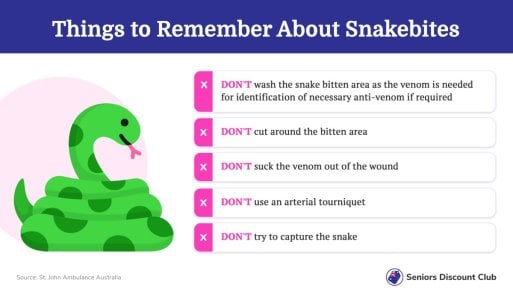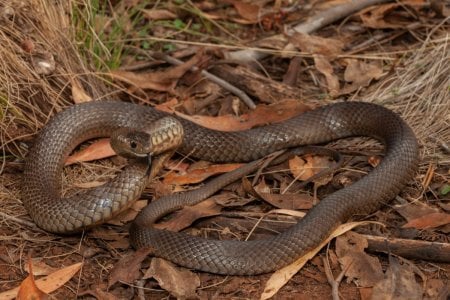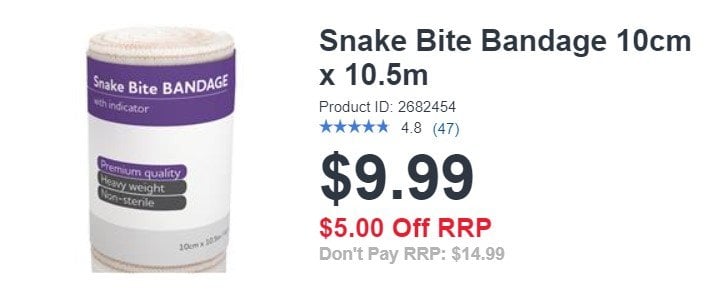Grandmother urges people to always carry bandages after life-threatening snake bite
A grandmother is issuing an urgent warning for people to always carry compression bandages after she narrowly escaped death in a terrifying snake bite ordeal.
Sixty-two-year-old Kate Miller was enjoying a solo surfing trip at Sandon Beach in September when she was suddenly bitten on the leg by one of Australia’s most venomous snakes—an eastern brown snake.
Eastern brown snakes are responsible for more deaths yearly in Australia than any other group of snakes. Their highly toxic venom can cause cardiac arrest and paralysis within minutes if left untreated.
'I pulled my towel off a log, I didn't see the snake underneath, and it just lurched at me and bit me,' Ms Miller recalled.
'The two bite marks where the fangs were, the blood was pulsing out, like blood comes out of a syringe,’ she added.
Ms Miller, a trained lifesaver, quickly snapped into action.
After asking nearby surfers to photograph the snake for identification, Ms Miller began bandaging her leg with a sarong to slow the spread of venom.
‘I sat down, and I pretended I was calm when I wasn't really,’ she admitted.
She even kept her sock so she could give it to the hospital for traces of venom.
‘We had a first aid kit, but we didn't have the right bandages, and my mistake was I elevated my leg,’ Ms Miller said.
‘Then a nurse came along, and she said “No, get it down lower than your heart”, and she bandaged it with snakebite bandages,’ she continued.
Elevating a leg is helpful in situations like swelling due to prolonged standing or reducing varicose vein symptoms, as it promotes better blood circulation by using gravity to help draw blood away from the leg.
Here are the things you should avoid if bitten by a snake:

Ms Miller was taken to Grafton Hospital, 136 kilometres away, and given antivenom.
Thankfully, the bandages were very effective in containing the venom, and Ms Miller said she only felt it circulating in her bloodstream upon their removal 6 hours after the bite.
Snake experts say eastern brown snake sightings are increasing as hot, dry conditions persist in Queensland and New South Wales.
In Kingscliff, Northern New South Wales, the surf club posted warning signs after several snake sightings were reported.
Greg Swift, a General Manager at the surf club, was concerned that people were unaware of the danger.
‘We're certainly seeing them more often, and we're seeing them out in the open, and to be blunt, we're seeing them where people are often seated and walking and riding,’ he shared.
He added: ‘There's a lot of them at the moment, so it's time to be really aware of them.’
Last month, a senior passed away from a suspected eastern brown snake bite after saving his friend. You can read more about this story here.
You can watch ABC News’ coverage of the story here:

What do you think of this story, members? Share your thoughts in the comments below!
Sixty-two-year-old Kate Miller was enjoying a solo surfing trip at Sandon Beach in September when she was suddenly bitten on the leg by one of Australia’s most venomous snakes—an eastern brown snake.
Eastern brown snakes are responsible for more deaths yearly in Australia than any other group of snakes. Their highly toxic venom can cause cardiac arrest and paralysis within minutes if left untreated.
'I pulled my towel off a log, I didn't see the snake underneath, and it just lurched at me and bit me,' Ms Miller recalled.
'The two bite marks where the fangs were, the blood was pulsing out, like blood comes out of a syringe,’ she added.
Ms Miller, a trained lifesaver, quickly snapped into action.
After asking nearby surfers to photograph the snake for identification, Ms Miller began bandaging her leg with a sarong to slow the spread of venom.
‘I sat down, and I pretended I was calm when I wasn't really,’ she admitted.
She even kept her sock so she could give it to the hospital for traces of venom.
‘We had a first aid kit, but we didn't have the right bandages, and my mistake was I elevated my leg,’ Ms Miller said.
‘Then a nurse came along, and she said “No, get it down lower than your heart”, and she bandaged it with snakebite bandages,’ she continued.
Elevating a leg is helpful in situations like swelling due to prolonged standing or reducing varicose vein symptoms, as it promotes better blood circulation by using gravity to help draw blood away from the leg.
Here are the things you should avoid if bitten by a snake:

Ms Miller was taken to Grafton Hospital, 136 kilometres away, and given antivenom.
Thankfully, the bandages were very effective in containing the venom, and Ms Miller said she only felt it circulating in her bloodstream upon their removal 6 hours after the bite.
Snake experts say eastern brown snake sightings are increasing as hot, dry conditions persist in Queensland and New South Wales.
In Kingscliff, Northern New South Wales, the surf club posted warning signs after several snake sightings were reported.
Greg Swift, a General Manager at the surf club, was concerned that people were unaware of the danger.
‘We're certainly seeing them more often, and we're seeing them out in the open, and to be blunt, we're seeing them where people are often seated and walking and riding,’ he shared.
He added: ‘There's a lot of them at the moment, so it's time to be really aware of them.’
Last month, a senior passed away from a suspected eastern brown snake bite after saving his friend. You can read more about this story here.
You can watch ABC News’ coverage of the story here:
Key Takeaways
- A brown snake bit a Queensland woman at a beach in Sandon in northern New South Wales.
- The woman, a lifesaver, used her sarong to lessen the impact of the snakebite, which was replaced by compression bandages. She eventually received an antivenom treatment.
- The woman remarked that the bandages were very effective in containing the venom, and she only felt it circulating in her bloodstream upon removal, about 6 hours after being bitten.
- There has been a reported increase in snake activity due to hot and dry conditions, particularly in Queensland and New South Wales, prompting concern from local communities.
What do you think of this story, members? Share your thoughts in the comments below!
Last edited:









